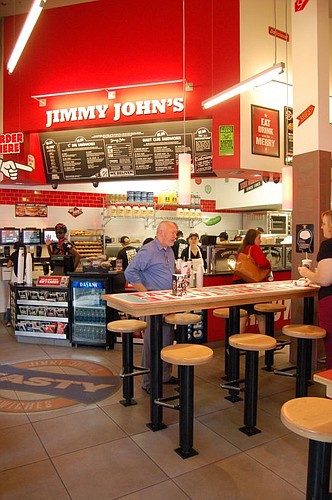
Capital investment of $3 million, 110 new jobs and 30,000 square feet of previously empty Downtown retail space to be occupied by employees and patrons.
Numbers like those could be called a good yield for a $544,185 investment of public funds from the first year of the Downtown Investment Authority’s Retail Enhancement Grant program.
“We’ve helped small-business owners and improved the experience for people who work, live and visit Downtown,” said Jim Bailey, chair of the authority’s board and publisher of the Daily Record.
To date, the program has awarded money to 10 businesses, leaving nearly $206,000 of the initial $750,000 pool still available.
Of the 10 businesses awarded grants since February, six have completed renovations and four are in progress.
The program is designed to recruit and retain restaurant and retail businesses in the Northbank core retail enhancement area, south of Church Street between Julia and Market streets.
Grants may be used by property and business owners to help renovate commercial space in older buildings. Projects must have a budget of $10,000 or more to qualify for a grant.
The authority may grant up to $20 per square foot leased or occupied, but the grant may not exceed 50 percent of the cost of renovation.
The projects account for nearly $2.2 million in property investment, including upgrades of electrical, plumbing and HVAC systems and facade and signage improvements.
Recipients are required to create at least two full-time equivalent jobs and remain in business at the location for a minimum of five years.
The recipients’ ventures represent an average of about 11 new jobs created per grant.
Funds may be distributed as a loan or a grant, secured with a lien on the property if the applicant is an owner or with a personal guarantee from a tenant. At the end of each year during the five-year term of the agreement, 20 percent of the loan or grant is forgiven.
Grants are not available for businesses seeking to change locations within Downtown or for construction of new buildings.
Also exempt are adult entertainment venues, single-serving package stores, business-to-business companies, nonprofits and government agencies.
Applicants must submit a comprehensive business plan, including the concept and target market of the business, an advertising and marketing plan, capital and cash flow analysis, and a summary of the management team’s skills and experience.
In addition, funds will be transferred only after renovation is complete and the authority confirms all requirements of the agreement have been met.
Bailey said the extensive documentation ensures applicants know what it takes to succeed in Downtown.
“We’re looking for people with experience and a proven track record. That lowers the city’s risk,” he said. “It’s not easy to get a grant. We are protecting the taxpayer’s money.”
Janice Donaldson is regional director of the Florida Small Business Development Center at the University of North Florida. The center for the past 40 years has helped active and potential small-business owners in North Florida be more successful.
She said the DIA grant program addresses two of the most common reasons that small businesses fail: management inexperience and underestimating what it will cost to start and maintain the venture.
The authority being able to offer financial resources can complete the formula for success.
“The No. 1 cause for failure in small business is undercapitalization,” said Donaldson. “We provide a lot of consulting, management assistance and training, but we don’t have any money.”
She cited the stringent application process and five years of monitoring results as factors that can contribute to the long-term success of the grant program.
“Ten businesses in a year is quite a track record. That shows they did a good job selecting recipients,” Donaldson said. “Monitoring the process is important, too. Sometimes, incentive-based economic development is criticized for not monitoring.”
Bailey said promoting retail growth will become increasingly important as more people live and work Downtown. He views the second year of the program as an opportunity to fine-tune the process.
The program could expand its scope to focus on vacant storefront space, currently more than 30 percent of Downtown’s street-level inventory.
While the authority promoted the program in its first year primarily to business owners, it could be an advantage to get property owners involved as the first step in the process.
“We could connect a building and a location with the right business,” Bailey said.
| Name | DIA funds | Full-time equivalent jobs | Total investment |
| Urban Grind Coffee Co. | $17,000 | 3 | $173,000 |
| Jimmy John’s | $28,000 | 12.5 | $442,601 |
| 120 E. Forsyth | $100,000 | 20 | $949,806 |
| Super Food & Brew | $49,837 | 10.5 | $99,675 |
| Zodiac Grill | $18,288 | 2 | $38,341 |
| Burrito Gallery | $73,000 | 8 | $233,000 |
| Daniel James Salon | $32,000 | 2 | $77,500 |
| Wine Decadence | $33,520 | 6 | $107,613 |
| Element Bistro | $90,260 | 23.5 | $216,629 |
| Black Sheep restaurant | $102,280 | 22 | $686,453 |
| Total | $544,185 | 109.5 | $3,024,618 |
Source: Downtown Investment Authority
(904) 356-2466